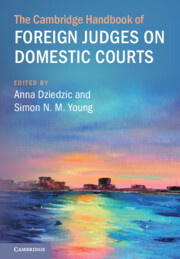Book contents
- The Cambridge Handbook of Foreign Judges on Domestic Courts
- The Cambridge Handbook of Foreign Judges on Domestic Courts
- Copyright page
- Contents
- Contents
- Figures
- Tables
- Contributors
- Acknowledgements
- Table of Cases
- Table of Legislation
- Table of International Instruments
- Abbreviations
- 1 An Introduction to Foreign Judges on Domestic Courts
- Part I Rationales, Motivations and Design
- Part II Implications and Impact
- First-Hand Accounts
- Judicial Identity and the Judicial Role
- Adjudication, Accountability and Independence
- 20 Foreign Judging and Securing Judicial Independence in the Anglo Caribbean
- 21 Importing Justice
- 22 Foreign Judges on Domestic Courts in the MENA Region
- 23 Foreign Judges on the Gambian Bench
- 24 The Syariah Factor
- 25 Foreign Judges
- 26 Shaping the Legal Landscape
- Index
25 - Foreign Judges
Adjudicating Papua New Guinea’s ‘Home-Grown’ Transformative Constitution
from Adjudication, Accountability and Independence
Published online by Cambridge University Press: 26 October 2023
- The Cambridge Handbook of Foreign Judges on Domestic Courts
- The Cambridge Handbook of Foreign Judges on Domestic Courts
- Copyright page
- Contents
- Contents
- Figures
- Tables
- Contributors
- Acknowledgements
- Table of Cases
- Table of Legislation
- Table of International Instruments
- Abbreviations
- 1 An Introduction to Foreign Judges on Domestic Courts
- Part I Rationales, Motivations and Design
- Part II Implications and Impact
- First-Hand Accounts
- Judicial Identity and the Judicial Role
- Adjudication, Accountability and Independence
- 20 Foreign Judging and Securing Judicial Independence in the Anglo Caribbean
- 21 Importing Justice
- 22 Foreign Judges on Domestic Courts in the MENA Region
- 23 Foreign Judges on the Gambian Bench
- 24 The Syariah Factor
- 25 Foreign Judges
- 26 Shaping the Legal Landscape
- Index
Summary
Papua New Guinea’s Constitution, made for its independence in 1975, provided the judiciary with broad, liberal powers to rectify the wrongs of colonialism, assist the country’s development, and meet the needs of a diverse people. This presents a challenge for judges, and particularly foreign judges, who are often unfamiliar with the constitutional history of Papua New Guinea or are reluctant to take an approach to judging that departs from the more conservative judicial roles preferred in their own jurisdictions. This chapter argues that foreign judges must adapt to their role as judges of Papua New Guinea, which requires relinquishing some of the biases and professional sensibilities ingrained from their training and experiences in other jurisdictions. It suggests that greater attention to the judicial ideology of foreign candidates, and prioritising recruits from jurisdictions with similar constitutional frameworks and colonial histories to Papua New Guinea, would help the judiciary to fulfil the transformative role envisaged for it by the Constitution.
- Type
- Chapter
- Information
- The Cambridge Handbook of Foreign Judges on Domestic Courts , pp. 427 - 446Publisher: Cambridge University PressPrint publication year: 2023

